|
thank you my dear friends and family!!!! this video, shown at the graduation ceremony, was the most touching part of the day!!
0 Comments
and the grading: pass with merit !! See you at the graduation ceremony 28.06.2024 10:30am at Hendon Campus/Middlesex University
Video-Presentation of Research 20 min Critical Review 21 pages
Reflective Essay 3 pages
Artifact 1 Video with talk with Dr. Thomas Kampe about my research. 51 min Artifact 2 Performance for Video 4 min Cultivating Questions What day is it today? Falling in love again? Can I sense my cells by rolling on the floor? Does my red blood cell sense gravity? Does my blood cell change function by sensing gravity? Is it helpful and healing to sense gravity? How can my somatic work reach out? Can my somatic work reach the beaches of Odessa and Sevastopol? Does it help anyone to roll on the beaches of Gaza and Tel Aviv? Can gravity change patterns of fear? Can we heal 5000 years of war? Do somatics speak other languages? Is bonding with gravity like falling in love? Can cells bond to heal? What day is it today? and Dieter, last words, ……….. don't be sad! Research Journal If we believe that there is a body-mind and if we use it for critical thinking and accademic writing we need to have some definitions. So please try to answer the following questions: #what is the bodymind? #what does it constist of? #how does work? #what is its purpose? #is there a mind-mind? when I look into wikipedia I find that: "The term bodymind is most generally used in the academic field of disability studies. Disability scholars use the term bodymind to emphasize the interdependence and inseparability of the body and mind. Disability studies scholars who have written academically about the bodymind include Eli Clare, Margaret Price, Sami Schalk, Alyson Patsavas, and Alison Kafer. Clare and Price have proposed that the bodymind expresses the interrelatedness of mental and physical processes, and Schalk defines the bodymind similarly as it pertains to disability and race." https://en.wikipedia.org/wiki/Bodymind?wprov=sfla1 maybe some other definitions are helpful: the american philosopher Wiliam H. Poteat defined the concept of mindbody: "One such idea, derived from both Michael Polanyi and Maurice Merleau-Ponty, is Poteat's conception of the mindbody (a term he coined): persons are neither (simply) minds in bodies nor (simply) bodies with minds, especially not in the manner that Descartes conceived of them as extended matter and immaterial consciousness. Instead persons are mindbodies, both minds and bodies at once, one and the same, inextricable in every aspect, such that "mind" and "body" taken separately in reflection are seriously distorting abstractions from the whole person that we are in our pre-reflective state. According to Poteat, one's mindbody is one's place in the world, the "oriented whence" of all of one's activities and the place by means of which, and only in relation to which, all other places and things can make any sense at all. In other words, the mindbody is the sentient, motile, and oriented self—the active center of every person's life." https://en.wikipedia.org/wiki/William_H._Poteat?wprov=sfla1 In my professional practice body and mind are the most basic definition of my method PME. tha is why I wrote an AOL with the title: "The Anatomy of Mind for Somatics" In this writing I am defining mind as follows: "Following now is the the dissecting of the mind and its functions, as I understood it from buddhist psychology in addition with my adaptions for somatic work. The mind is clear and realizing: The mind has no matter it is clear, the mind is everything that is not body. The mind is everything that distinguishes a dead body from a living person. So the mind consists of sensations, images, feelings, thoughts, intentions and so on. The mind is the sign that the body is alive, the mind is the force that makes a body alive. The mind and the body make up a living person, but the mind does not have a defined and fixed place in the body, which means that the mind is not only situated in the brain . The mind is that instance in a person that realizes. It realizes by either perceiving or imagining .The mind is clear by nature but it is filled with images and perceptions. In order to perceive, the mind needs sense organs and content coming from these sense organs. In this definition of the mind thinking is in the same category as the sense organs, thinking has the same value as the sense organs and it has the same task as the sense organs which is bringing information to the mind so that the mind can perceive and realize this information.Traditionally in this system there are only five sense organs, the sense organs that are sensing the outside, which are, eyes, ears, nose, taste organs and touch organs.In my system, because I'm working with sensing the body in my somatic work, I added also the sense organs that are sensing the inside of the body which are the kinesthetic sense and the proprioceptive sense.( see picture No: 4 ) Reflecting on this system one can see that these definitions are solving a lot of questions, discussions and problems in philosophy as well as in the somatic world. The “agnosco ergo sum” (I realize, therefore I am) is not so far away from Descarte´s “cogito ergo sum” (I think, therefore I am), but it gives the body a strong place. This system includes physical sensations in the mind and gives them the same value as thinking. Using this system makes the philosophical questions about embodied cognition obsolete as well as it is diminishing the question whether there is something like a “bodymind”, which is a strong believe in the somatic field.This system solves these problems, because in this system the mind can sense its body and then the body is in the mind, and then we can think about our physical sensations and imagine different physical states."
I want to share some reflections why I don´t like "practice as research" for what artists and somatic workers are doing.
the time aspect: * the artist is doing forward search he is imagening something that is not there PRE-SEARCH * the somatic worker is searching the here and now he is sensing and experiencing the body and its movement NOW-SEARCH * the academic is searching the past he is RE-flecting on signs and traces and data RE-SEARCH the practice aspect: * as an artist practice is the most boring part of the job, as it is the repetition of a given form to get some "technique", like practising a plie or a musical scale. * for a somatic worker the practice is the architectural space, where one-on-one sessions are happening in. the power aspect: seeing art as science is admiting that science has won the power race about being the official instance that is allowed to explain life. One could argue that science is colonising the arts with its langugage and thinking, and the power and resources of its institutions. why not: science as art ? revolution as research ? sensing as truth ? I am looking forward to feedback and discussion you can find my research journal here:
https://www.somatic-training.com/research-journal I am sharing my research proposal and helens feedback and markingsheet here with you. It would be great to also read your proposals!
In tudays zoom discussion we talked a lot about the artifact that we have to deliver at the end of the study.
So I did some inquiry about the word and its definition: german wikipedia: "scientifically worthless..." "In diagnostics, an artifact is an apparent, but in fact unintentionally artificially induced causal relationship, for example, due to errors in data collection, evaluation, documentation, or interpretation. Artifacts are products or phenomena created by human or technical influence. They are scientifically worthless because they say nothing about the actual object of investigation, but are merely a source of diagnostic error. " english wikipedia: "error in the perception..." "In natural science and signal processing, an artifact or artefact[1] is any error in the perception or representation of any information introduced by the involved equipment or technique(s).[2]" that makes it interesting for me! I was asking ChatGPT: what is the difference between embodiment and somatics?
And I have to admit, the answer was not bad: "Embodiment and somatics are two related concepts that are often used interchangeably, but there are some important differences between the two.Embodiment refers to the idea that the mind and body are not separate entities, but are deeply intertwined and mutually influencing. Embodied cognition research shows that our physical experiences and movements can shape our thoughts, emotions, and perceptions. The body is also seen as a site of knowledge, where we can access deep intuition and insight that is not available through rational thought alone. Embodiment is often associated with practices like mindfulness, meditation, yoga, and other contemplative traditions that emphasize awareness of the body and its sensations. Somatics, on the other hand, is a more specific term that refers to a holistic approach to the body that emphasizes its subjective, felt experience. Somatic practices often involve movement, touch, and awareness of bodily sensations to promote healing, self-awareness, and personal growth. Somatic therapies can be used to address a range of physical and emotional issues, including chronic pain, trauma, anxiety, and depression. Somatics is often associated with modalities like bodywork, dance, somatic psychology, and other forms of therapy that focus on the body as a primary source of information and transformation. In summary, embodiment is a broader concept that encompasses the idea of mind-body integration, while somatics is a more specific approach that emphasizes the subjective experience of the body and its role in healing and personal growth."
feedbacking back to my cohort: here is the protocol of the PVG meeting of last year.
and the agenda of this years meeting:
thanks everybody for our discussion tonight!
these are the insparations that I noted down that I want to look into: Dr Amanda Williamson on self and co-regulation in Somatic movement therapies Les Todres, Embodied Enquiry Celeste Snowber, Embodied Inquiry Sondra Fraleigh, Back to the Dance Itself - phenomenological perspectives Karen Barbour, Dancing Across the Page Barbour also writes about ‘somatophobia’ the western fear of bodily knowing Akinleye & Kindred, ‘In the between-ness: decolonizing and re-inhabiting our dancing - we discuss here the limits of language for expression of lived felt experiences Valerie Preston-Dunlop and Susan Leigh Foster talk a lot about dance as a ‘language’ - very contested area of debate Margaret Whitehead - Physical Literacy Pedagogy of the Oppressed , Paulo Friere here is another root of "Somatic Studies"
In germany in the 19th centuary there was a movement amongst psychatric medical doctors that called themselfs "Somatiker" (in opposition to the "psychikern") that believed that all mental illnesses had a physical root, more precise: are rooted in the brain. Considering the newest brain research about trauma, and the effect that trauma has on the brain which leads to physical and mental illnesses these are really interesting roots: "In the middle of the century, a "somatic reaction" (somatiker) formed against the speculative doctrines of mentalism, and it was based on neuroanatomy and neuropathology." https://en.wikipedia.org/wiki/History_of_psychology https://de.wikipedia.org/wiki/Somatiker in my inquiry I found today the philosopher and sociologist Helmut Plessner.
His thinking could be a theoretical base for the somatic practices: "His masterwork of Philosophical Anthropology is "Levels of Organic Life and the Human", which argues that the humans are 'naturally artificial beings' within living nature and attempts revocation of mind-body dualism." "the formal qualities that make up our consciousness a priori — given as the conditions through which we experience things — conditions such as time, space, causality and number, and, indeed, the laws of physics, however we may then conceptualize them, are given to us both in our own physical nature, and in the physical nature of the environments we inhabit, through our growth from and interactions within these environments. " https://en.wikipedia.org/wiki/Helmuth_Plessner Hi everybody!
In my first informal meeting with helen and my collegues melody and mathew we decided on areas of feedback, so that we can structure our feedback in a more helpful way: please give critical as well as positive feedback about:
for your feedback: please leave a comment on this post or email me: dieter.rehberg[at]pme.or.at or phone or whatsapp: +43 650 5458610 or leave an anonymous feedback here: https://app.conceptboard.com/board/368m-t9at-88bi-k3t2-pq1d also the next MAPP Cafe will be a possiblility to share your feedback: sunday 26.2. at 5pm CET https://us02web.zoom.us/j/87999754460?pwd=blhQQVUxME9xK1JBUHBzYmVjNVlEdz09 Meeting-ID: 879 9975 4460 Kenncode: 293629 thanks Dieter this picture below was a joint production of my students and me in the module "Anatomical Embodiment & Somatic Movement" of the "Basic Somatic Training", that just finished last week.
the texts came out of the reflections and writings after sensing and perceiving different bodyparts. so it is a kind of artefact describing the outcome of a somatic research: the next MAPP-Cafe is in 3 weeks, sunday 26.2. at 5pm CE
Dieter Rehberg / somatic-training.com lädt Sie zu einem geplanten Zoom-Meeting ein. Thema: MAPP Cafe Uhrzeit: 26.Feb. 2023 17:00 Wien Zoom-Meeting beitreten https://us02web.zoom.us/j/87999754460?pwd=blhQQVUxME9xK1JBUHBzYmVjNVlEdz09 Meeting-ID: 879 9975 4460 Kenncode: 293629 #MAPP - Cafe I prepared a zoom link for a second Mapp - Cafe on sunday 5th of february 5pm cet:
Dieter Rehberg / somatic-training.com lädt Sie zu einem geplanten Zoom-Meeting ein. Thema: MAPP - Cafe 2 Uhrzeit: 5.Feb. 2023 17:00 Wien Zoom-Meeting beitreten https://us02web.zoom.us/j/81609880813?pwd=SDg4TldXb0RKMmhLNms2a1NFOVBrZz09 Meeting-ID: 816 0988 0813 Kenncode: 899346 Dieter A Student of mine put my attention to a facebook post, and after applying some critical thinking I wrote an answer.
this text was posted on facebook site: “movement archery” of the two dance artists: Roser Tutusaus and Tom Weksler: “It is difficult to think, speak and write about the movement of the spine. To move it is quite easy though, furthermore it moves by itself. Arguably every movement we do includes spinal movement. Our body is filled with tracts, neural pathways that connect the central nervous system with the spinal cord. So in a way, every action goes through both the spine and the brain by default. The non-default is the scale of the movement and our ability to recognize it, both spatially and internally. Neuroplasticity relates to the ability to change the internal pathways of movement and information. That means to create new connections between a bodypart, space, brain and spine. So for example, if I always think about the hand and the fork when I cut a piece of Schnitzel and put it in my mouth, paying attention to my posture with every bite will eventually lead to neuroplasticity. Simple huh? Evidently, yes. Practically, no. The spine, like the brain, is an extremely vital thing to our being. Therefore, it is a very secured place. Just like any reflex of our body will resist throwing the weight of the skull towards a stationary object, most muscles in the body will take over resistance and motion much before the spine does. So when we think we move the spine we do it minimally and mostly move other things. And this is a good thing! Movement is best done through collaboration of coordinations and not as isolated patterns. Nevertheless, the dominance of accessible coordination over others eventually leads to kinesthetic stagnation and not to adaptation. In that sense despite the constant involvement, the spine moves "little". Drilling spinal waves or back bridges like there's no tomorrow is a questionable path towards making new neural pathways. They could be wonderful ways to condition or drill some patterns but the "core work" should be done through awareness to what we normally do without potent attention to the spine. To conclude, the study of the spine is rooted in allowing vulnerability and concentration. Both are universally primal, but rarely practiced in our adult life. "Life itself begins more with an inward spiral rather than an upward thrust" (G. Bachelard) *In the second paragraph, bodypart relates to the sensory information that is received or stored through a place in the body. So in this context, bodypart is a perceptive physical point.” This is my answer to the post:. The post is written in a very convincing language, but at least three things that are written in this post are not true: 1.) ” So in a way, every action goes through both the spine and the brain by default ” . There are a lot of nerves that do not go through the spine, because they directly come out of the skull. ( for instance the Vagus nerve) 2.) ”So for example, if I always think about the hand and the fork when I cut a piece of Schnitzel and put it in my mouth, paying attention to my posture with every bite will eventually lead to neuroplasticity.” Neuroplasticity is the ability of the Nerve System to change, develop and learn (which is meant by the word ”plasticity”). This process is happening all the time as long as the brain gets enough oxygen to be sensing inwards and acting outwards. Neuroplasticity does not depend on awareness or attention to happen. Just with awareness and attention and other helpful qualities of sensing the nerve system gets different, more helpful, information and can ”plastify” in a more helpful way. So coming back to the example of the post: First of all you need to sense knife and fork and not think about knife and fork in order to plastify the brain in a way that changes your activity. But if you do sense, neuroplasticity will happen already there. And sensing is going on all the time anyway, and sensing is going on all the time everywhere in the body, also always in both the hands and the spine. So by just sitting and cutting your schnitzel neuroplasticity is going on with consequences for your whole body. But only if you have a special attention and quality of sensing and use that in a dialogue to change your movements and actions the nerve system can plastify also in a more helpful way. 3.) ” Just like any reflex of our body will resist throwing the weight of the skull towards a stationary object, most muscles in the body will take over resistance and motion much before the spine does. ” A reflex is a specific pattern in the nerve system, where a specific sensory input leads to a specific reaction without a willful conscious decision. Inputs and reactions can be manifold. There are reactions that involve only specific muscles or organs, others involve body parts or the whole body. As far as I know there is no reflex that will resist throwing the weight of the skull towards a stationary object. We usually do not do that, because we have normally no reason for doing that, and we rationally assume that this will be painful, which has nothing to do with a reflex. But there are very special, abnormal circumstances where people do through their heads against walls. But once the head gets hurt, the pain can trigger a lot of reflexes. According to my understanding there is no usual first reaction of the extremities before a reaction of the spine in a case of resistance. But one would need to specify what incident would cause the resistance. A sting of a bee in your hand would cause a different reflex of resistance than a loud noise behind your back. More complex movement patterns, that build on the reflexes, do integrate first in the spine and later in the extremities when we learn to move as babies. Although I do agree with the author's conclusion that awareness is essential for changing movement patterns, I also think that in our profession we should try to be as precise as possible with our words, and not throw around with words like ”neuroplasticity” and ”reflexes” just to make our text sound more interesting And I think it always needs a helpful and healing quality of sensing to start a dialogue that is open ended and eventually can lead to more helpful and healing actions, that can lead to a more helpful plastification of the brain. all the best Dieter Rehberg I am still reading and stay inspired by Ernst von Glasersfeld Book: "Radical Constructivism"
I found video series on youtube about lectures Glaserfeld did at the university of innsbruck. it is always good to see how a thinker moves and speaks, it is like getting also the somatic information of the persons philosophy. https://youtu.be/NnKmuuy6aic other books that I found for my research:
while teaching todays SOMATIC MOVEMENT online class I realised that I have to think my talking and writing and advertising NOT from the capitalistic thinking of selling, but from describing somatics and my work as a healthy research in ones own life. And life is changing and developing all the time, that is why I cant and dont want to produce a product that I can multiply in an industrial way. I can offer real human connection, individual communication, care and solidarity, possibilties for learning and development
I should say and write and organise my website around that and make clear that also my website is in creative changing all the time as is life. |
|||||||||||||||||||||||||||||||||||||||||||||||||




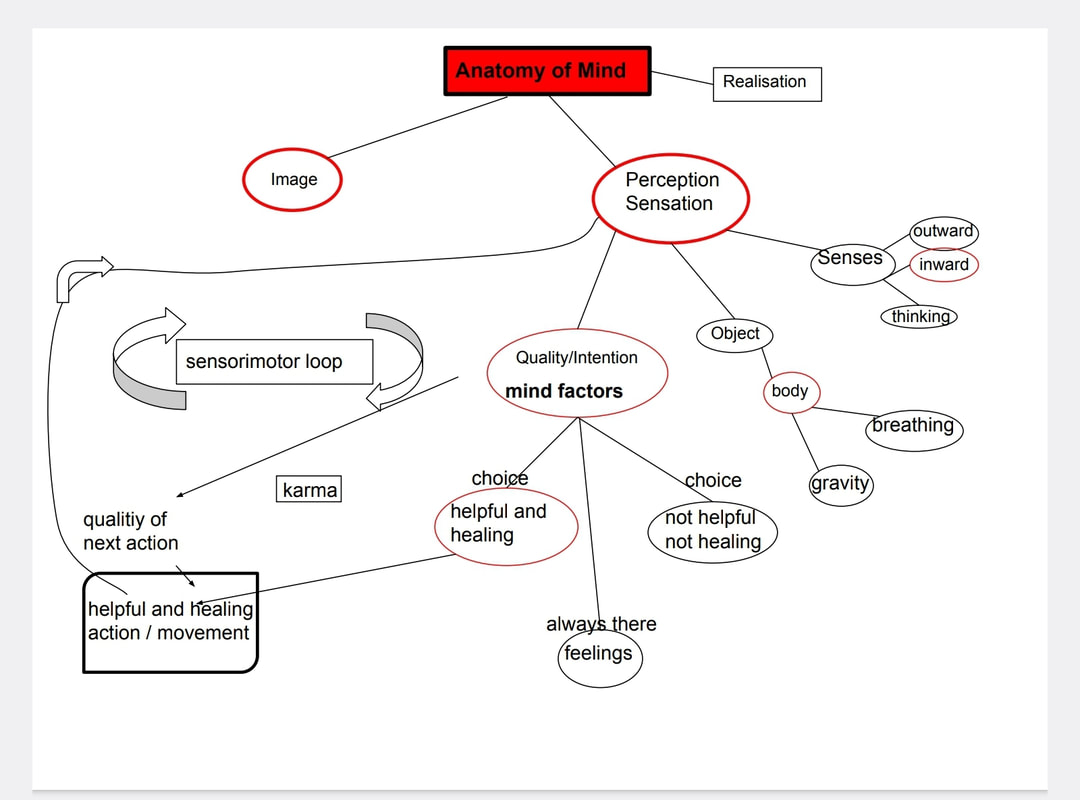

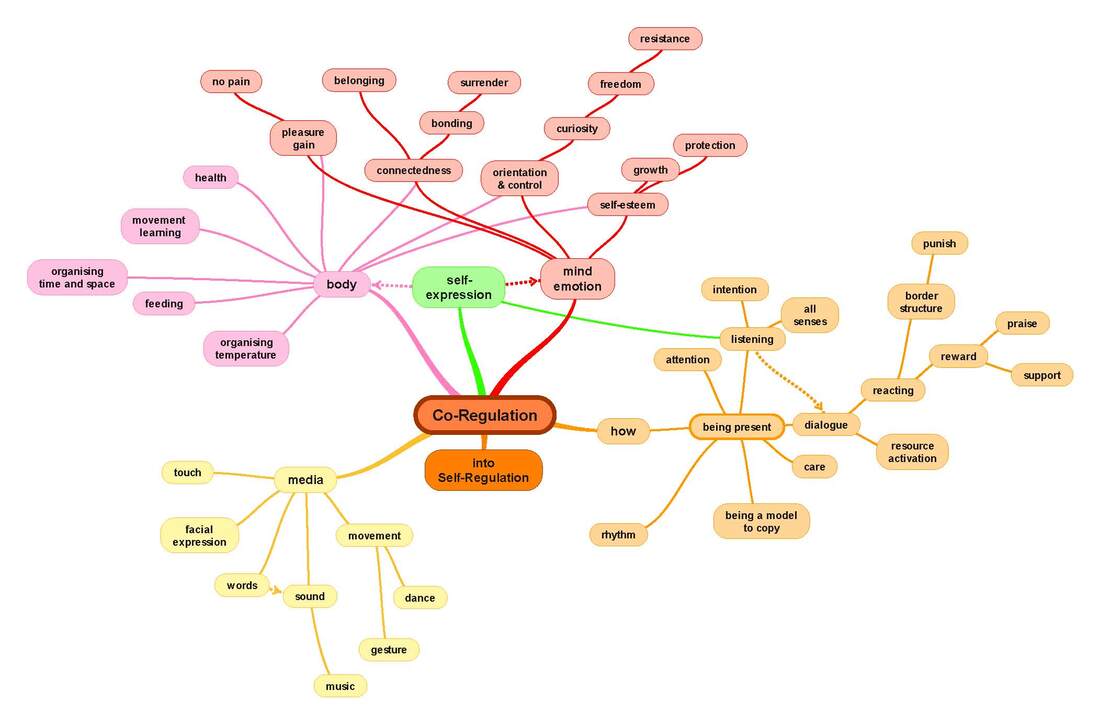
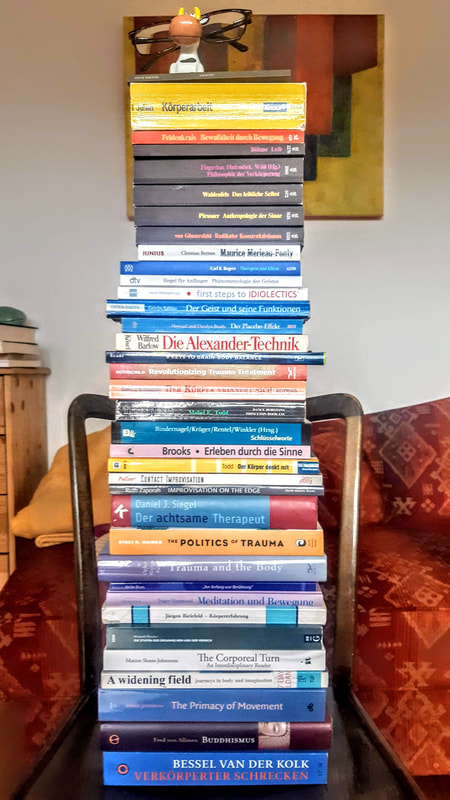
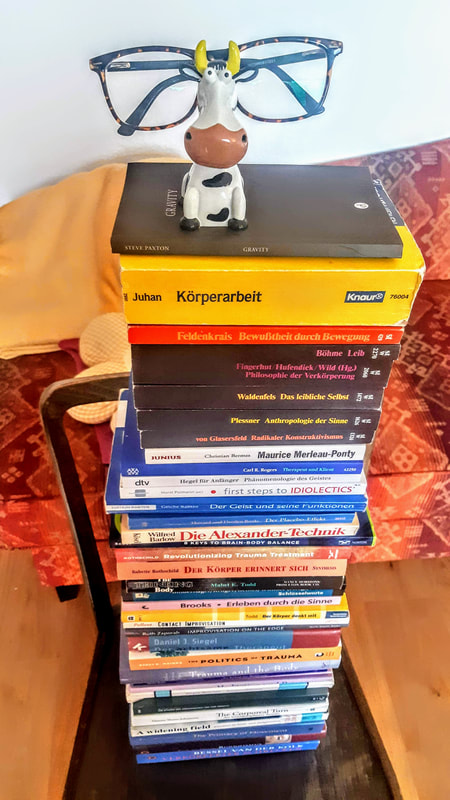
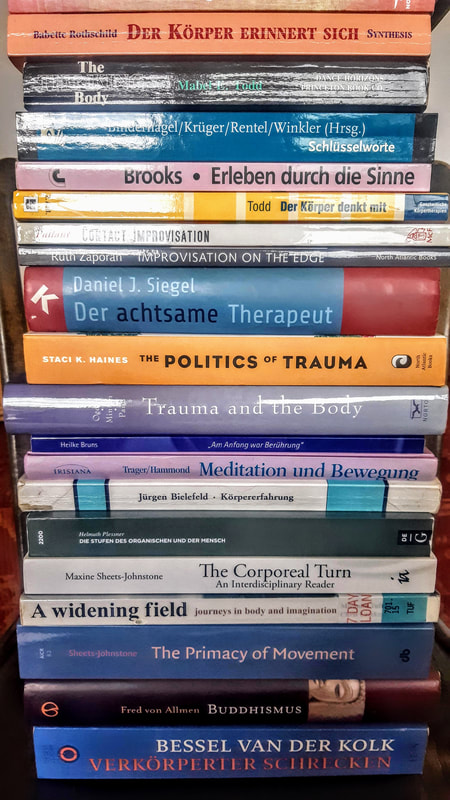
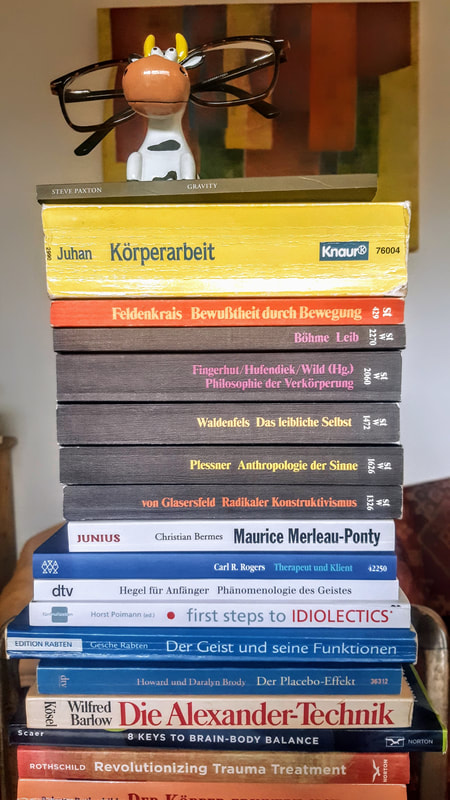
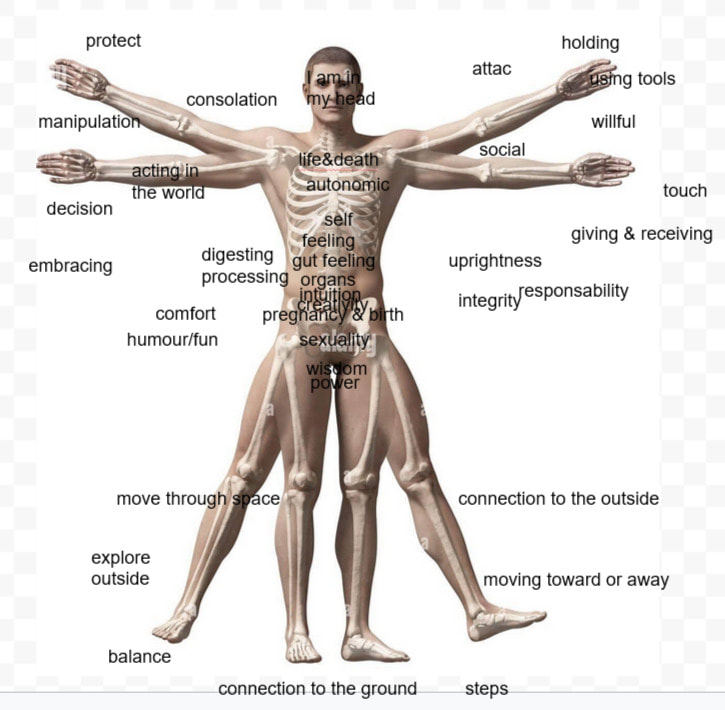
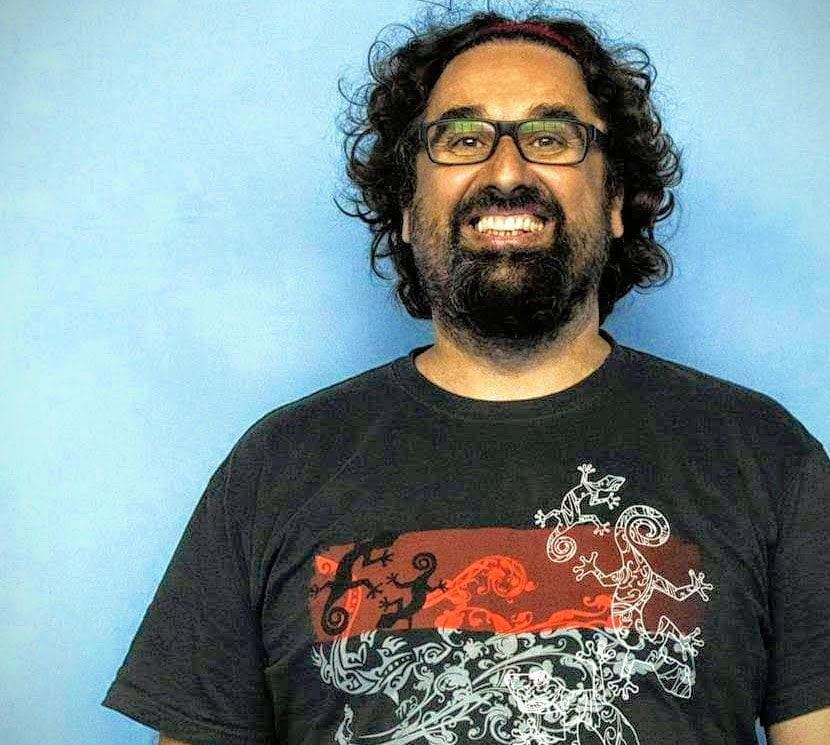
 RSS Feed
RSS Feed

